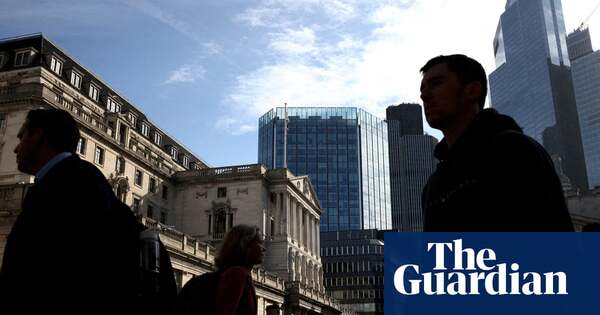Sunak will be feeling the pressure from this if inflation doesn’t actually come down.
deleted by creator
Yeah. Ultimately this is the BoE’s fault for not acting faster and harder. Interest rates would still have gone up but the pain may have been less severe.
Sunak was a fool for trying to take credit for Inflation. He based it on the optimistic predictions that inflation would rapidly come under control and improve towards the end of the year. Instead inflation is not shifting, and interest rates are likely to need to stay higher for longer and probably go up further, plus we’re now realistically looking at a potential recession.
Sunak is out of his depth, and it’s yet another poor leader in a run of 4 now (May, Johnson, Truss) showing how depleted the Conservative party is of talent and any sort of vision.
deleted by creator
Exactly, he made a promise he will not be able to deliver. It will almost certainly come back to bite him in the next year. The general public are not financially literate enough to understand inflation in the first place.
Which makes why he’d make that mistake even more ridiculous.
Unless he was as good an IB as he is PM ofc…
sunak has zero control over interest rates, (or inflation) but hes said specifically he will bring inflation down.
Not quite. Inflation can be caused from the supply side, and from the demand side. While inflation caused by the demand side (covid stimulus) could only be addressed by BoE rates, the inflation caused by supply side (covid disruptions in supply chain, followed by Russia → Ukraine war hitting energy prices, and continuous problems arising from brexit) is something that he could influence.
So, to sum it up, he has partial influence over the inflation, and in addition to what he could control about the supply side of inflation, he was betting that BoE would be doing a better job controlling the demand side of inflation.
@noodle Technically he could take away the BOA’s independence if he truly wanted to, I believe Liz Truss threatened to do exactly that when they were fighting her tax plans, but the markets probably wouldn’t like it if he did. It’s weird to think that not so very long ago, politicians having complete control over interest rates was entirely normal.
I read one interesting take that his promise may even have made inflation worse, as some economic actors will have made investment decisions based on an assumption that inflation would half (pushing up inflation further).
I’m not actually that sold on that theory, but it’s an interesting angle.
Christ. Glad I’m fixed for the next four years but that’s no solace for those affected on trackers etc.
Same here. Although I distinctly remember my mortgage provider asking us if we were comfortable if the interest rate went up. Multiple times. I’m pretty sure they “stress tested” our mortgage payments assuming 9 - 10% interest. Of course we told them it would be hard, but still within our budgets then laughed and said it would never happen.
I’ve got sympathy for people in this situation for sure… but how have they managed their household budgets and savings such that this is a shock to them? Or have they over stretched themselves with their mortgage?
I remember looking at the 10% stress test on the paperwork and thinking “oof”, but feeling a bit safer that people are at least being made aware of this when they take out a mortgage.
This was brought in last year to change the way stress testing on applicants runs. Previously, you had to be able to withstand 7% (iirc, don’t quote me), it’s now a 1% rise stress test, though the 4.5x salary limits still apply.
AHH interesting that makes more sense then because we remortgaged before those changes in the rules.
As an example, a borrower taking out a two-year fixed-rate mortgage at 2.2% with a revert to rate of 4% would need to show they could afford the monthly repayments on a rate of 7%.
I mean… they ain’t going to be coming off onto the 4% 🥲 but stress testing at 7% should still (for the time being) mean that everyone with a mortgage should have been aware of the risks and budgeted accordingly. No?
No-one wants to pay more of course… I have sympathy for that. I just don’t understand the shock that some people are claiming.
Unfortunately our 5 year fixed is ending in the next couple of months, brilliant timing. Tried to apply for a remortgage and the offer was pulled before they processed the application. Great timing!
Can someone smart explain this to an A-level econ student?
The inflation we’re seeing is mostly imported cost push, from rising energy prices, cost of raw materials ect, which interest rates should have marginal impact on, no?
The IR is used to impact AD and change demand pull inflation, and is risen to lower investment and consumption and therefor DP inflation, which appears to already be very low.
Why is the BoE increasing IR to counter inflation that isn’t demand driven? Is it just to make it look like they’re doing something or am I dumb?
An answer from my wife who works in UK finance and spent the better part of the day dealing with this decision:
_The short answer is, this is still the best tool they have to deal with inflation, but it’s a blunt tool.
A lot of the inflation is driven by external factors, but part of what they’re trying to do, it prevent an inflation spiral where higher energy and food prices feed into a higher cost of other goods… labour… Etc.
Q: Will it work?
Her A: At this point they are very late [as others have said here] and increasingly looks like the only way this works is if they hike rates to a level that forces a recession [yay /s]._Maybe if mortgage payments are twice as high people won’t be able to spend as much on anything else and inflation will fall just because less is being spent on food etc??
I’m not clear on how the inflation stats work when modelling the amount of items people buy Vs the price of the basket.







